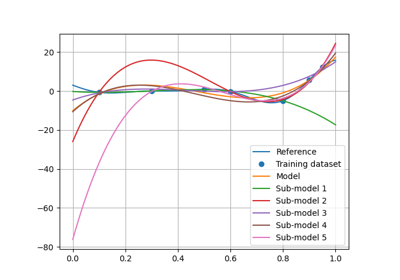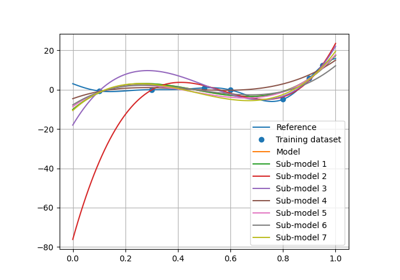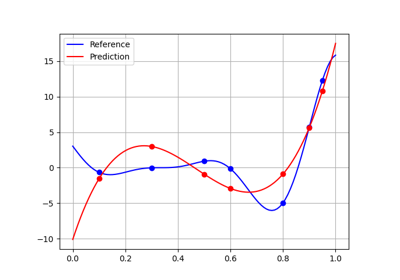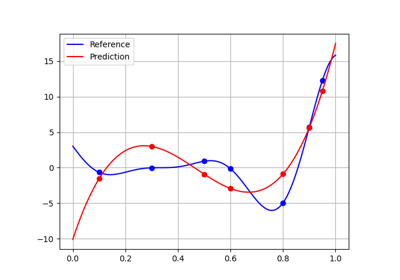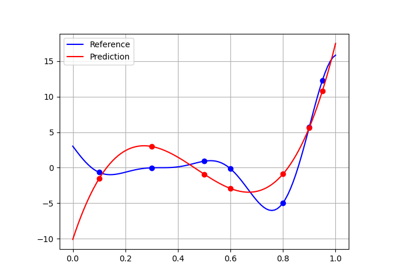linreg module¶
Linear regression model.
The linear regression model expresses the output variables as a weighted sum of the input ones:
where the coefficients \((w_1, w_2, ..., w_d)\) and the intercept
\(w_0\) are estimated by least square regression. They are easily
accessible via the arguments coefficients and intercept.
The penalty level \(\alpha\) is a non-negative parameter intended to prevent overfitting, while the penalty ratio \(\lambda\in [0, 1]\) expresses the ratio between \(\ell_2\)- and \(\ell_1\)-regularization. When \(\lambda=1\), there is no \(\ell_1\)-regularization, and a Ridge regression is performed. When \(\lambda=0\), there is no \(\ell_2\)-regularization, and a Lasso regression is performed. For \(\lambda\) between 0 and 1, an Elastic Net regression is performed.
One may also choose not to penalize the regression at all, by setting \(\alpha=0\). In this case, a simple least squares regression is performed.
Dependence¶
The linear model relies on the LinearRegression,
Ridge, Lasso and ElasticNet
classes of the scikit-learn library.
- class gemseo.mlearning.regression.linreg.LinearRegressor(data, transformer=mappingproxy({}), input_names=None, output_names=None, fit_intercept=True, penalty_level=0.0, l2_penalty_ratio=1.0, random_state=0, **parameters)[source]¶
Bases:
BaseMLRegressionAlgoLinear regression model.
- Parameters:
data (IODataset) – The learning dataset.
transformer (TransformerType) –
The strategies to transform the variables. The values are instances of
BaseTransformerwhile the keys are the names of either the variables or the groups of variables, e.g."inputs"or"outputs"in the case of the regression algorithms. If a group is specified, theBaseTransformerwill be applied to all the variables of this group. IfIDENTITY, do not transform the variables.By default it is set to {}.
input_names (Iterable[str] | None) – The names of the input variables. If
None, consider all the input variables of the learning dataset.output_names (Iterable[str] | None) – The names of the output variables. If
None, consider all the output variables of the learning dataset.fit_intercept (bool) –
Whether to fit the intercept.
By default it is set to True.
penalty_level (float) –
The penalty level greater or equal to 0. If 0, there is no penalty.
By default it is set to 0.0.
l2_penalty_ratio (float) –
The penalty ratio related to the l2 regularization. If 1, use the Ridge penalty. If 0, use the Lasso penalty. Between 0 and 1, use the ElasticNet penalty.
By default it is set to 1.0.
random_state (int | None) –
The random state passed to the random number generator when there is a penalty. Use an integer for reproducible results.
By default it is set to 0.
**parameters (float | int | str | bool | None) – The parameters of the machine learning algorithm.
- Raises:
ValueError – When both the variable and the group it belongs to have a transformer.
- DataFormatters¶
alias of
RegressionDataFormatters
- get_coefficients(as_dict=True)[source]¶
Return the regression coefficients of the linear model.
- Parameters:
as_dict (bool) –
If
True, return the coefficients as a dictionary. Otherwise, return the coefficients as a numpy.arrayBy default it is set to True.
- Returns:
The regression coefficients of the linear model.
- Raises:
ValueError – If the coefficients are required as a dictionary even though the transformers change the variables dimensions.
- Return type:
- get_intercept(as_dict=True)[source]¶
Return the regression intercepts of the linear model.
- Parameters:
as_dict (bool) –
If
True, return the intercepts as a dictionary. Otherwise, return the intercepts as a numpy.arrayBy default it is set to True.
- Returns:
The regression intercepts of the linear model.
- Raises:
ValueError – If the coefficients are required as a dictionary even though the transformers change the variables dimensions.
- Return type:
- learn(samples=None, fit_transformers=True)¶
Train the machine learning algorithm from the learning dataset.
- load_algo(directory)¶
Load a machine learning algorithm from a directory.
- Parameters:
directory (str | Path) – The path to the directory where the machine learning algorithm is saved.
- Return type:
None
- predict(input_data)¶
Predict output data from input data.
The user can specify these input data either as a NumPy array, e.g.
array([1., 2., 3.])or as a dictionary, e.g.{'a': array([1.]), 'b': array([2., 3.])}.If the numpy arrays are of dimension 2, their i-th rows represent the input data of the i-th sample; while if the numpy arrays are of dimension 1, there is a single sample.
The type of the output data and the dimension of the output arrays will be consistent with the type of the input data and the size of the input arrays.
- predict_jacobian(input_data)¶
Predict the Jacobians of the regression model at input_data.
The user can specify these input data either as a NumPy array, e.g.
array([1., 2., 3.])or as a dictionary, e.g.{'a': array([1.]), 'b': array([2., 3.])}.If the NumPy arrays are of dimension 2, their i-th rows represent the input data of the i-th sample; while if the NumPy arrays are of dimension 1, there is a single sample.
The type of the output data and the dimension of the output arrays will be consistent with the type of the input data and the size of the input arrays.
- Parameters:
input_data (DataType) – The input data.
- Returns:
The predicted Jacobian data.
- Return type:
NoReturn
- predict_raw(input_data)¶
Predict output data from input data.
- Parameters:
input_data (RealArray) – The input data with shape (n_samples, n_inputs).
- Returns:
The predicted output data with shape (n_samples, n_outputs).
- Return type:
RealArray
- to_pickle(directory=None, path='.', save_learning_set=False)¶
Save the machine learning algorithm.
- Parameters:
directory (str | None) – The name of the directory to save the algorithm.
path (str | Path) –
The path to parent directory where to create the directory.
By default it is set to “.”.
save_learning_set (bool) –
Whether to save the learning set or get rid of it to lighten the saved files.
By default it is set to False.
- Returns:
The path to the directory where the algorithm is saved.
- Return type:
- DEFAULT_TRANSFORMER: DefaultTransformerType = mappingproxy({'inputs': <gemseo.mlearning.transformers.scaler.min_max_scaler.MinMaxScaler object>, 'outputs': <gemseo.mlearning.transformers.scaler.min_max_scaler.MinMaxScaler object>})¶
The default transformer for the input and output data, if any.
- IDENTITY: Final[DefaultTransformerType] = mappingproxy({})¶
A transformer leaving the input and output variables as they are.
- LIBRARY: ClassVar[str] = 'scikit-learn'¶
The name of the library of the wrapped machine learning algorithm.
- SHORT_ALGO_NAME: ClassVar[str] = 'LinReg'¶
The short name of the machine learning algorithm, often an acronym.
Typically used for composite names, e.g.
f"{algo.SHORT_ALGO_NAME}_{dataset.name}"orf"{algo.SHORT_ALGO_NAME}_{discipline.name}".
- algo: Any¶
The interfaced machine learning algorithm.
- property coefficients: RealArray¶
The regression coefficients of the linear model.
- property intercept: RealArray¶
The regression intercepts of the linear model.
- property learning_samples_indices: Sequence[int]¶
The indices of the learning samples used for the training.
- resampling_results: dict[str, tuple[BaseResampler, list[BaseMLAlgo], list[ndarray] | ndarray]]¶
The resampler class names bound to the resampling results.
A resampling result is formatted as
(resampler, ml_algos, predictions)whereresampleris aBaseResampler,ml_algosis the list of the associated machine learning algorithms built during the resampling stage andpredictionsare the predictions obtained with the latter.resampling_resultsstores only one resampling result per resampler type (e.g.,"CrossValidation","LeaveOneOut"and"Boostrap").
- transformer: dict[str, BaseTransformer]¶
The strategies to transform the variables, if any.
The values are instances of
BaseTransformerwhile the keys are the names of either the variables or the groups of variables, e.g. “inputs” or “outputs” in the case of the regression algorithms. If a group is specified, theBaseTransformerwill be applied to all the variables of this group.

